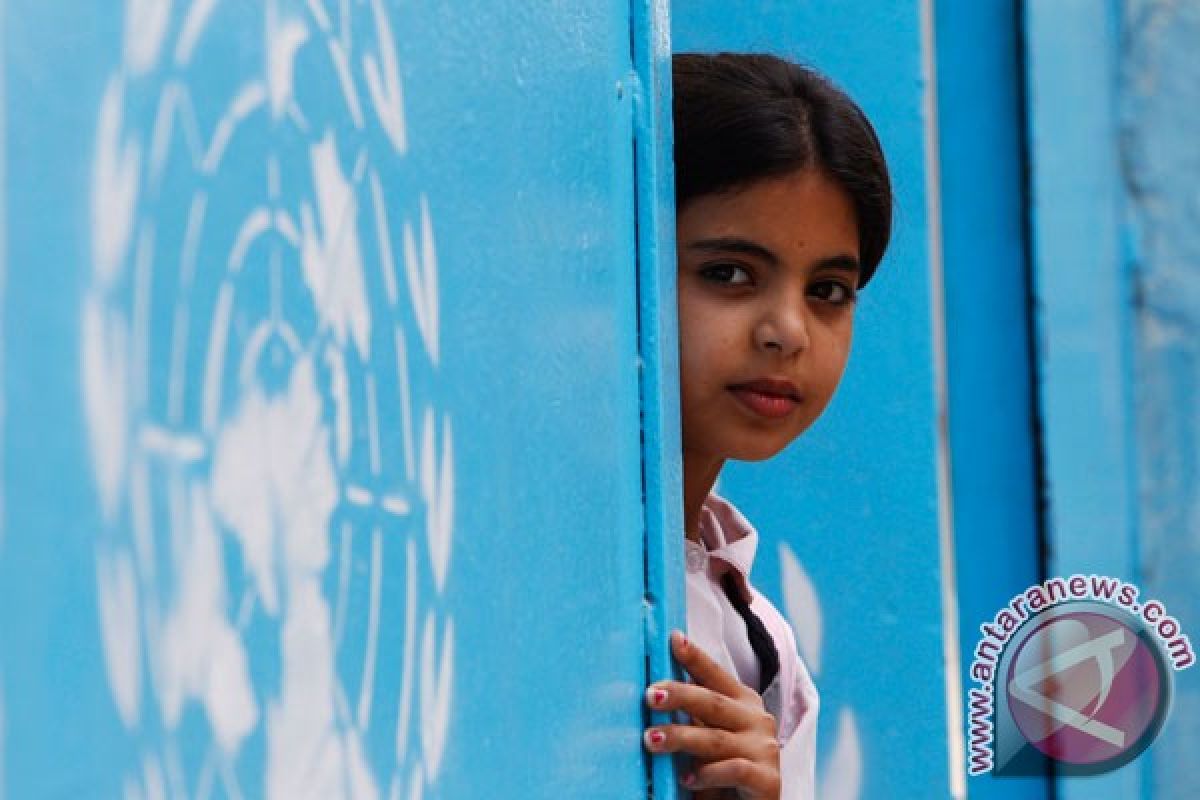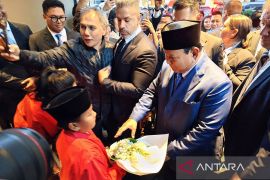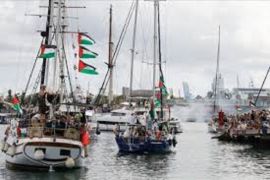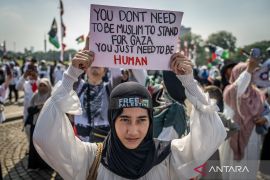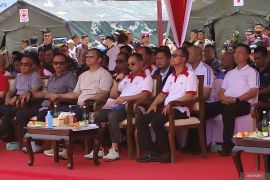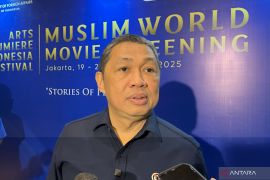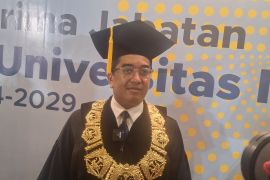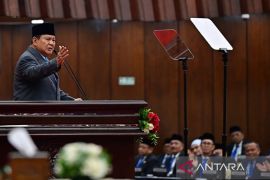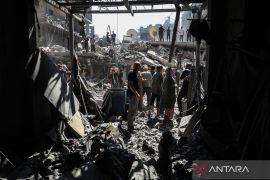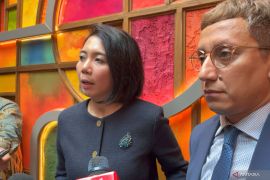We must also see to it that the establishment of a Palestine state in 2013."Jakarta (ANTARA News) - As a staunch supporter of Palestine, Indonesia has often expressed its commitment to helping prepare the establishment of Palestine`s state by providing capacity building programs for Palestinians.
In July 2008, Indonesia hosted a New Asian African Strategic Partnership (NAASP) Ministerial Conference on Capacity Building for Palestine. Participants of the meeting agreed to provide training programs for 10,000 Palestinians within a five-year period, from 2008 to 2013.
NAASP was created during the Asian African Summit held in Jakarta in 2005 and co-chaired by Indonesia and South Africa.
Indonesia has also been acting as a coordinator for Afghanistan, Azerbaijan, Bangladesh, Brunei Darussalam, China, the Philippines, India, Iran, Japan, South Korea, Cambodia, Laos, Malaysia, Pakistan, Singapore, Sri Lanka, Syria, Thailand, Timor Leste, and Vietnam.
Earlier this month, Indonesian Coordinating Political, Legal and Security Affairs Minister Djoko Suyanto and Japanese Foreign Minister Koichiro Gemba met in Tokyo to discuss extending their joint support for capacity building in Palestine.
Further, President Susilo Bambang Yudhoyono has pledged that Indonesia would train 1,000 Palestinians. Through 2010, Indonesia had organized more than 30 training programs for 126 Palestinians.
The training programs organized by Indonesia included training courses on Fire Rescue, Project Cycles, Gender Mainstreaming for Officers of the Ministry of Women`s Affairs and a training course on Coal and Mineral Resources Management.
From June 4 to July 5, 2012 five Palestinians participated in a construction and water search training course organized by the Indonesian defense ministry. Implementing the training course was mandated in the Declaration on the New Asian African Strategic Partnership (NAASP) to contribute to the development of Palestine.
This September, Indonesia organized at least two programs, including Training on Records and Archives Management, at the Indonesian Archives center (ANRI), and Capacity Building Program on Textile for Empowering Palestine`s Human Resources at the industry ministry, which has set a target of providing training for at least 1,000 Palestinians from 2008 to 2013, according to a press statement of the ministry.
Also, in various regional and international forums, Indonesian Foreign Affairs Minister Marty Natalegawa has been active in supporting Palestine`s struggle for independence.
In the 16th Summit of the Non-Aligned Movement (NAM) held in Tehran, Iran, last August, Natalegawa stated the issue of Palestine remains on top of the Movement`s agenda.
"The cause of our brothers and sisters in Palestine is the cause of the NAM. It is also Indonesia`s cause. We must, therefore, take concrete and vigorous steps to ensure that Palestine`s bid for enhanced status in the United Nations succeeds this year. We must also see to it that the establishment of a Palestine state in 2013, as envisioned by Palestinian leaders, is realized," the minister stated.
Natalegawa told Indonesia`s media on the sidelines of the NAM ministerial meeting in Tehran that Indonesia has proposed a number of concrete steps during the Summit that will facilitate the establishment of Palestine as an independent state.
"Indonesia has conveyed a number of concrete measures. How come there has been no significant progress regarding Palestine in the last few years?" Natalegawa asked.
During the meeting, Indonesia urged NAM members to unite in support for and express solidarity towards Palestine, and to take specific actions to help the country.
Natalegawa said the atrocities committed against Palestine by Israel must not be tolerated nor regarded as normal, as this will desensitize the world community towards Palestine`s problems.
Indonesia also called upon other NAM member countries, which have diplomatic ties with Israel, to take a firm stance against the country by severing existing relations.
"NAM members should also refuse to buy Israeli products made in occupied territories," he stated.
Indonesia also reiterated its commitment towards supporting Palestine`s bid to join the United Nations as a full-time member.
"There are at least 40 NAM member countries that have yet to recognize Palestine. Let`s encourage them and ask them to give recognition to Palestine," Natalegawa said.
Good news came from Thailand in early August this year, when Thai Prime Minister Yingluck Shinawatra signed an announcement on the establishment of diplomatic relations between the Kingdom of Thailand and the State of Palestine. Thailand is both a member of the Association of Southeast Asian Nations (ASEAN) and NAM.
Indonesian Vice President Boediono, representing Indonesia at the Tehran Summit, urged the 120-member-nation Movement to take more concrete and practical actions in support of the Palestinian cause.
Indonesia proposed that NAM take urgent and concrete actions with regard to five key issues. First, how to respond effectively to illegal Israeli activities. Second, support and promote the Palestinian bid for UN membership.
Third, promote and support the institutional capacity building of Palestine. Fourth, support reconciliation among Palestinians; and finally, effectively engage the media to raise public awareness about the Palestinian cause.
"We are encouraged that such an action-oriented outlook has found resonance among the Committee members. We are hopeful that this can also guide the entire Movement," Boediono noted before leaders of the NAM member nations.
In his inauguration speech at the NAM summit, Iran Supreme Leader Ali Khamenei asked participants in the NAM summit to pay special attention to the Palestinian issue, and called on the American backers of the Israeli regime to accept Iran`s proposal for a referendum on the Palestinian lands to determine the country's fate.
The NAM opening ceremony then heard from Egyptian President Mohammad Morsi, UN Secretary General Ban Ki Moon, Indian Prime Minister Manmohan Singh, UN General Assembly President Nassir Abdulaziz Al-Nasser, and Iranian President Mahmoud Ahmadinezhad.
Other high profile speakers during the Summit included the Presidents of Afghanistan, Bangladesh, Benin, Burkina Faso, Central African Republic, Chad, Comoros, Cote d'Ivoire, Djibouti, Mongolia, Palestine, Pakistan, Sri Lanka, Sudan, Uganda, and Zimbabwe, as well as the Prime Ministers of Bhutan, Cambodia, Iraq, Lesotho, Nepal, Swaziland, and Syria.
On August 5, 2012, an extraordinary summit on Palestine was supposed to be held in Ramallah, Palestine, but the summit was forced to be cancelled because Israel prevented delegates from entering Ramallah.
Indonesia and 12 members of NAM`s special committee for the support of Palestine`s freedom condemned Israel for not providing access to the participants of the extraordinary summit in Ramallah.
"Israel`s argument that some participating countries have no diplomatic ties so it would not allow the participants to enter Ramallah is weak, because it is known that the conference was going to be held in Palestine, not in Israel," said the Indonesian foreign ministry in a statement.
Israel did not allow Minister Marty Natalegawa and other NAM delegates, including the Foreign ministers from Malaysia, Bangladesh, Cuba and Algeria, who were already in Jordan, to attend the summit in Ramallah.
"The Israeli action violates international law. We deeply deplore the fact that the extraordinary summit in Ramallah was cancelled due to its blockade. Israel`s latest action strengthens NAM`s intention to help the Palestinian people obtain their freedom," the statement said.
The delegates also asked NAM`s Coordination Bureau in New York to take the Israeli action seriously.
(T.F001/INE/KR-BSR)
Reporter: by Fardah
Editor: Priyambodo RH
Copyright © ANTARA 2012
